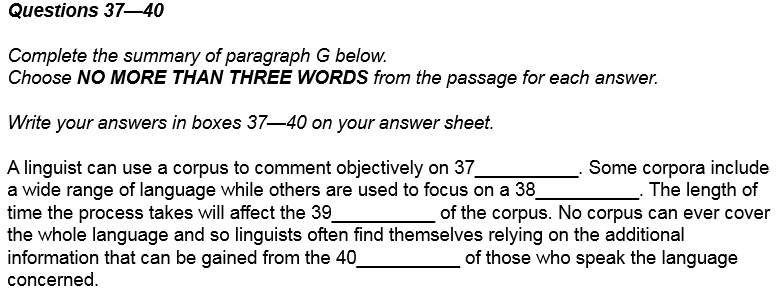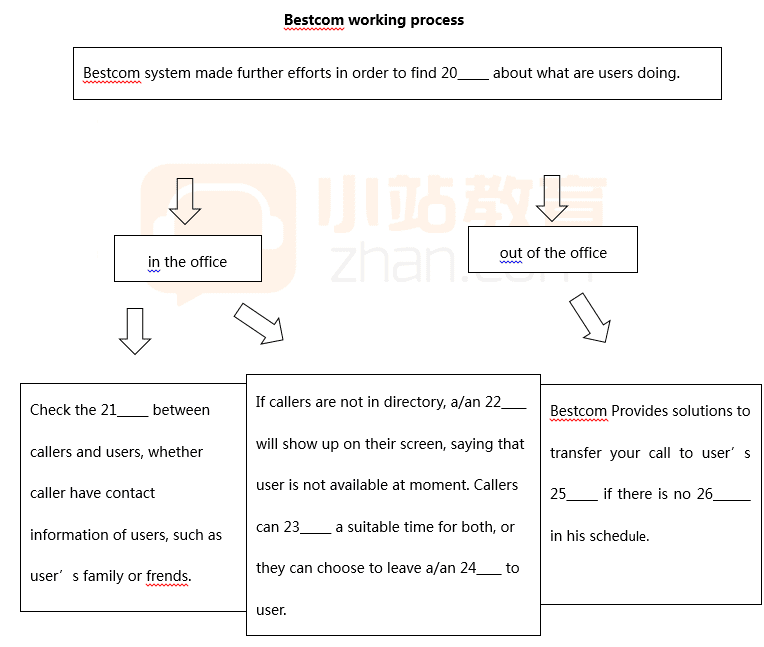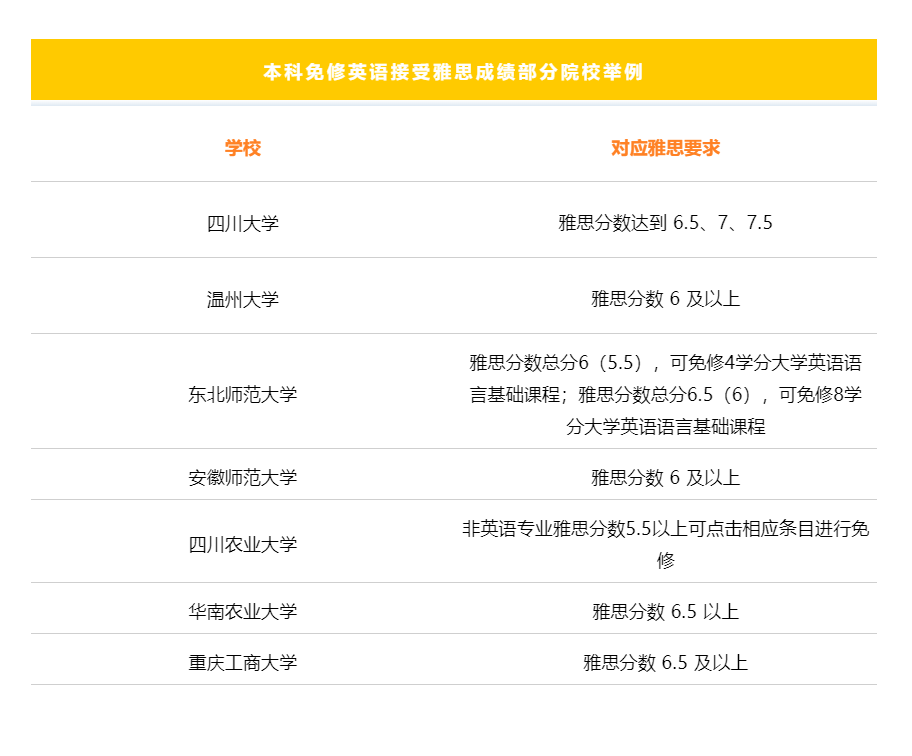雅思阅读考试有时候成绩出来了很多同学觉得错误,想要复议又纠结怕分数没有变化,下面小编给大家带来了雅思阅读考试易忽视的三大失分点,希望能够帮助到大家,下面小编就和大家分享,来欣赏一下吧。
雅思阅读考试易忽视的三大失分点
雅思阅读考试失分点一:遇到生词,束手无策,无法正常进行阅读和做题
雅思阅读考试文章来源于国外原版的期刊或杂志,话题覆盖面广,科技,自然,环保,社会,文化,工作,生物,地理等无不涉及,所以遇到生词在情理之中。但一部分烤鸭遇到生词后就信心全失,慌乱至极,打破了自己原有的阅读节奏和速度,做题时也因为生词被卡壳,结果题目不仅没有解出,还影响了后面的做题速度和时间,可谓“一发动而迁全身”。对此,专家认为,生词的出现在所难免,只要大家有基本的词汇量,完全可以将生词的问题逐一击破。
A. 有时候生词属于比较专业的词汇,它们的出现不是为了考察考生的词汇量,更多的是检阅大家的应变和判断能力。尤其在题目中出现的所谓生词,更是可以坏事变好事,成为考生定位答案的线索词。
比如:在剑桥7 “Why pagodas don't fall down”一文,5-10题的分类题中第6题“tiles on eaves”,很可能考生在三个单词中有两个都不认识,这时候如何是好呢?首先,先观察这两个生词的词性。在介词“on”的前后,且分别加了“s”, 可以判断是名词。在这篇建筑类的文章中论及我们不认识的名词,想必不是日常词汇,所以完全可以把“tiles”和“eaves”作为定位词去原文寻找答案。
B. 有时候生词的含义可以在上下文中直接得到。在雅思阅读文章时遇到的生词,有相当一部分的含义可以通过多种猜测单词的方法得到,所以,在生词的周围或上下文寻找其解释不失为有效途径。
例如,剑桥4的文章“How much higher? How much faster?”中,有这样一个句子:“One of the most important new methodologies is biomechanics, the study of the body in motion.” “biomechanics”这个单词从构词法上看,我们只能够知道其和生物有关,此时,看后面的同位语部分就能很好的帮我们解释这个词的意思,直接且易懂,即对身体在运动状态下的研究。
雅思阅读考试失分点二:不能权衡做题的优先性,无法把握做题时间
很多烤鸭在面对雅思阅读考试时,都会感叹时间不够,有的考生会剩下半篇文章没有读完,更有甚者,一个小时只够用来做两篇文章。其中做题速度无法达到要求的原因有很多,词汇量,阅读方法,做题技巧无一不是。此外,还有一个很重要的因素:不会取舍,不会衡量做题的优先性。专家提示,雅思阅读3篇文章,存在难易程度的差别。考生应选择自己擅长或熟悉的话题文章优先做。而对一篇文章而言,做题顺序可以如下排布:Heading题 ---- 填空型题(表格,图示,简答,summary, 完成句子) ---- 判断题 ---- 选择型题(单选,多选),平均每篇文章的做题时间控制在20min, 如时间到,还有少量题目(1-2题)没有做完,可放宽少许时间完成。若还余留多题未完成,建议先舍弃,做下一篇文章,因为不排除下一篇文章,看似文章话题难,但题目容易的情况。难度系数高的题目在每个人面前都一样,我们希望确保容易的题目百分百的拿下。
雅思阅读考试失分点三:对题目考点把握不清,不知如何确定keywords
很多考生在平时的练习和考场上面对划keywords总是单一的跟着感觉走,或是将一道题目中大部分的词都划下来作为keywords, 完全失了方向和重点,直接导致答案很难在原文锁定。所以,keywords是对题目的浓缩,也是题目的线索词,更是考点。考生们应该在平时的课堂和练习中,多加总结考点词的特点,以达到用一到两个词就涵盖整个题目的效果。利用keywords定位答案,更集中目标,更有方向性。
例如:在剑桥7,“Why pagodas don't fall down”的分类题中,“size of eaves up to half width of the building”, 这道题目看似比较长,信息多,其实如果了解数字是一个考点,就能果断划出half这个keywords, 并且根据做题经验,预测到其在原文必定会变换形式成fifty percent。如果在原文寻找答案前就把握了以上这些,找起来自然速度快了许多。
无论考试还是练习,错误在所难免,失分也是情理之中,但如果我们能从失分点中获得经验和新的认知,失分点会骤变为优势。雅思阅读的提高不仅仅是话题单词的记忆,题型技巧的掌握,如果能从错误中学习总结,相信会更加有效。
雅思阅读练习题:Are you busy in the right way?
Busy, busy, busy — but not really getting anything done? From the idea of the “busy trap” to the overwhelming(不可抑制的) feeling many professionals have at the end of each day and week, overload(负担过重) is a real issue. But what if we’re looking at the issue in the wrong way? What if you could reframe(再塑造) your thinking, feel less busy and perhaps get more done? It’s a topic several LinkedIn Influencers weighed in on(对......发表意见) this week. Here’s what two of them had to say. “I don’t know when it happened, but somewhere along the way we were convinced that being ‘busy’ was good for us,” wrote Spurlock in his post Being Busy is a Waste of Time. Spurlock himself has “all but the word busy” from his personal and workplace vocabulary. (Spurlock自己的个人和工作场所词汇中“绝无忙碌这个词”。) “We’re not busy … we’re productive(多产的;有生产力的),” he wrote. “And yes, there’s a difference.” “Busy paints a picture of people who are either keeping themselves occupied or who don’t have the time to do other things,” Spurlock explained. (Spurlock解释道,“忙碌描画出人的这样一幅图画:他要么忙得不可开交,要么就是根本没有时间做其他事情。”)“Productive describes an environment rich with goals, personal and professional achievements and wrapped in(卷入) success, a place where you're actually creating something vs just doing something.” Spurlock breaks productivity down to(把......细分) four categories. Among them: “Personal productivity… is the most important one, as it centres around the time that I make to spend with my family, my friends and doing things that fulfil me as a living person,” he wrote. “I know it’s odd to look at the time you spend with your family as being productive... but by doing so, I’m mentally making it more important. I’m giving it the same weighted value that I put on being able to keep a roof over my head and food on the table.(我给它赋予与维系身家生存同等重要的价值。) Personal productivity keeps me human and reminds me what really matters in this world." “Financial productivity is an important one, as these are the projects that create consistent revenue, they keep the dog fed, the interwebs working and gas in the tank, but they also free us up to focus more on the first two (personal and creative productivity),” Spurlock wrote. “By shrouding(遮盖) all of these areas of my life in the nature of being productive, I am making them more valuable,” he concluded. “There are tangible(实实在在的) results, both personally and professionally, associated with them. By looking at my work and my time through this lens, it makes them all more rewarding.” “Being busy has somehow become a badge of honor. The prevailing(主导的) notion is that if you aren’t super busy, you aren’t important or hard working,” wrote Bradberry in his post How Being Busy Makes You Unproductive. “The truth is, busyness makes you less productive.” He went on to say, “When we think of a super busy person, we think of a ringing phone, a flood of emails and a schedule that’s bursting at the seams with major projects and side-projects hitting simultaneously(同时),” he wrote. “Such a situation inevitably leads to multi-tasking(多任务处理) and interruptions(干扰), which are both deadly to productivity.” As Socrates said: Beware the barrenness(无趣) of a busy life. There’s some proof to that statement. “David Meyer from the University of Michigan published a study recently that showed that switching what you’re doing mid-task increases the time it takes you to finish both tasks by 25%,” Bradberry wrote. Another data point: “Microsoft decided to study this phenomenon in their workers and found that it took people an average of 15 minutes to return to their important projects… every time they were interrupted by e-mails, phone calls, or other messages,” Bradberry wrote. “They didn’t spend the 15 minutes on the interrupting messages, either; the interruptions led them to stray to other activities, such as surfing the web for pleasure.” But why do we feel we’re getting so much done when we’re so busy? “We’re so enamored(迷恋) with multitasking that we think we’re getting more done, even though our brains aren’t physically capable of this,” Bradberry wrote. “Regardless of what we might think, we are most productive when we manage our schedules enough to ensure that we can focus effectively on the task at hand.” (无论我们怎么认为,如果我们处理事务时确保有效聚焦在手头工作,我们的生产力就是的。) In some studies, it was found that people use business to “hide from… laziness and fear of failure”.(有些研究发现,人们用忙碌当借口来“掩盖......懒惰和失败的恐惧) “We burn valuable time doing things that aren’t necessary or important because this busyness makes us feel productive,” he wrote. “As it turns out, you really do have to slow down to do your best.” Vocabulary overwhelming 势不可挡的 overload 负担过重 reframe 再构造 eliminate 消灭 be wrapped in 卷入 shroud 遮盖 tangible 实实在在的 simultaneously 同时 multi-tasking 多任务处理 interruption 干扰 barrenness 无趣; 荒凉 enamor 迷恋 (be enamored with... 迷恋上......) Questions: 1. Why, according to Spurlock, is spending time with family as important as winning food on the table? 2. What is Bradberry's attitude toward keeping busy by multi-tasking? Imitable sentences: 1. I don’t know when it happened, but somewhere along the way we were convinced that being ‘busy’ was good for us. 我不清楚从何时起,我们开始相信”忙碌“对我们来说是好事。 2. By looking at my work and my time through this lens, it makes them all more rewarding.” 用这种方式来看,我的工作和时间显得更加有价值。 3. Being busy has somehow become a badge of honor. The prevailing(主导的) notion is that if you aren’t super busy, you aren’t important or hard working, 忙碌似乎已经成为荣誉勋章。主导观念是,如果你不是超级忙,你就不重要,或者没有努力工作。 4. We’re so enamored(迷恋) with multitasking that we think we’re getting more done, even though our brains aren’t physically capable of this. 我们迷恋同时干多项任务,认为这让我们做得更多,虽然从物理学上讲,我们的大脑根本不能这样做。 5. In some studies, it was found that people use business to “hide from… laziness and fear of failure”. 有些研究发现,人们用忙碌当借口来“掩盖......懒惰和失败的恐惧。
雅思阅读练习题:The inevitable and beneficial daydreaming?
Daydreaming has a bad reputation, but neuroscientists(神经科学家)are beginning to realise that a wandering mind is not only typical – it might be beneficial. Sit down, relax and think of nothing. Struggling? There might be a good reason why your mind seems to wander even when you try very hard to switch off: your brain never really rests. And contrary to popular belief(与普遍观点相反), those idle daydreams might even be beneficial. For years, neuroscientists worked on the assumption(假设;理论)that our brains work hard when given a specific job to do, and switch off when we’re not mentally stimulated(刺激). This is why you’ll read about experiments in which volunteers perform a task – tapping a finger, performing some mental arithmetic, looking at evocative(唤起记忆的)pictures – while their brain is scanned. The scan reveals which parts of the brain become more active during the task and which become less active. In this way it is possible to work out how our brain controls our behaviour. Often the neuroscientists want to explore brain activity for a number of different tasks, so they need a way of getting the brain back to a neutral state(中性状态) between tests. This is typically done by asking the person to stare at a simple white cross(十字架)in the middle of a black screen. By thinking about nothing in particular, the theory goes, the brain should basically switch off. There is just one problem: it doesn’t. The first sign that a resting brain is surprisingly active came two decades ago. A student called Bharat Biswal was studying for a PhD at the Medical College of Wisconsin in Milwaukee. He was investigating(研究)ways to get a purer signal from a brain scanner, when he noticed that the resting brain isn’t doing nothing.(他正在研究如何从脑部扫描仪中提取一种更纯的信号,却发现休息的大脑并不是没有工作。) Even when people were told to clear their minds or to stare at a cross, activity in the brain continued. Not only that, the brain scans seemed to reveal this activity was actually coordinated(协调的). Then in 1997 an analysis incorporating(包含,整合)the results of nine brain scan studies revealed another surprise. Gordon Shulman hoped his analysis would help identify the network that comes to life when people pay attention. But he discovered the opposite – the network which is activated when we do nothing. It would make sense for the brain to become more active when volunteers shifted from resting to performing a task. Instead, Schulman noticed that some areas of the brain consistently(总是,一贯地)became less active when the resting period ended and the activity began. This suggested that while people were lying quietly in the scanner supposedly doing nothing, parts of their brains were in fact more active than when the volunteers were actively performing a task.(这表明,当志愿者静静地躺在扫描仪中,似乎什么都没做,其大脑的某些部分反而更活跃,甚至比他们积极完成一项工作时更活跃。) It took a while for the idea that the brain never rests to catch on(变得流行,被人理解). For years neuroscientists had thought that brain circuits(线路)switched off when they weren’t needed. In 1998 the neuroscientist Marcus Raichle, now one of the leaders in the field, even had a paper rejected by a referee who said “the apparent activity must surely be down to an error in the data”.(神经科学家Marcus Raichle现在已经是该领域的领头人之一,但在1998年,他的一篇论文甚至被审稿人给拒绝了,理由是“大脑看起来很明显的活动状态一定是由于数据出现错误”。) Today things are very different. Almost 3000 scientific papers have been published on the topic of the brain’s surprisingly busy “resting state”. Some object to(反对) this term for the very reason that the brain isn’t resting at all. They prefer instead to talk about the “default mode network”(默认状态网络) – the areas of the brain which remain active while we are apparently idle. The big question is: why is the idling brain so active? There are plenty of theories, but no agreement yet. Maybe different brain areas are simply practising working together. Perhaps the brain is staying active like an idling car, just in case it needs to act suddenly. But it’s possible that those mind wanderings and replays of our day play a vital role in helping us to consolidate(加强) our memories. We know that our dreams seem to play a part in sorting out our memories – now there is evidence that it happens during the day too (in rats, at least). We also know that when the mind is left to wander, it often focuses on the future. We start thinking about what we’re going to eat in the evening or where we’re going to go next week. All three of the chief areas of the brain involved in imagining the future are part of the default mode network. It is almost as though our brain is programmed to contemplate(思考)the future whenever it finds itself unoccupied(空闲的). Moshe Bar from Harvard Medical School thinks there might be a very good reason for that. He believes daydreaming essentially creates memories of events that haven’t happened. This gives us a strange set of “prior experiences” we can draw on to help us decide how to act if the daydreams ever do come to pass. (这就给我们一套奇怪的“前经验”,如果白日梦真的发生了,我们可以利用这些经验来决定自己采取的行动。)For instance, many air travelers have wondered what it might be like to crash. Bar’s idea is that if the plane did actually crash, the memories of all those daydreams from previous flights would come into play and help the passenger decide how to behave. But the resting state is not easy to investigate. As some cognitive psychologists have pointed out, just because a person is lying in a scanner we can’t be sure that they are alone in their thoughts, introspecting(内省). They could be thinking about the sounds of the scanner and what’s happening around them. For this reason there are still plenty of unanswered questions about mind wandering. For instance, are the daydreams we experience when we’re trying – and failing – to focus on our work different from the ones we have when we’re deliberately(有意地) trying to switch off?(比如,当我们试图—或者没做到—专心工作时体验到的白日梦,与我们刻意要关闭大脑时体验的白日梦有什么不同?) Progress is being made, though. A study published earlier this year hinted that we might all experience the resting state in a slightly different same way. Researchers conducted a detailed brain scan study of five people who had been trained to recount their mind wanderings in detail every time they heard a computer beep. The researchers found considerable(相当大的) differences between each person’s daydreaming thoughts and experiences. In September researchers at the University of Oxford used scans from the Human Connectome Project of 460 people’s brains in a resting state to explore which parts of the brain communicate with each other when we are at rest. Again, the results hinted at personal differences in the resting state – this time linked to life skills and experiences. The strength of the connections between different parts of the brain varies with the strength of a person’s memory, their years of education and their physical endurance.(大脑不同部分之间联系的强度取决于个人记忆力的强度、受教育长短及其身体耐力。) It is as though parts of the brain remain connected when our mind wanders just in case we need them to do something. Scientifically, the discovery that the brain is never truly at rest could help make sense of a longstanding mystery: why does the brain uses 20% of body’s energy when the activities we know it performs should need only about 5%?Marcus Raichle has labelled the missing 15% the brain’s “dark energy” – resting state activity might account for some of this discrepancy(差异,缺口).(为什么大脑使用了身体能量的20%,而大脑完成我们所知的活动仅需要5%?Marcus Raichle将那消失的15%称为大脑的“黑能量”—休息状态下的活动也许能部分解释这15%的缺口。) The discovery of the resting state also has the potential to change the way we each feel about our brains. We know how hard it is to empty our minds. We know how our minds have a frustrating tendency to wander even when we don’t want them to. But the emerging picture suggests these quirks(怪癖)might actually be beneficial – even if they do prevent us from finishing a task in time to meet a deadline. In other words, perhaps it’s time to celebrate the virtues of an idle mind. (换句话说,我们也许该歌颂一下胡思乱想的美德了。) Vocabulary Neuroscientist 神经科学家 Popular belief 通行的观点 Assumption 假设,前提 Stimulate 刺激 Evocative 召唤的;引起回忆的 Neutral 中性的 Cross 十字架 Investigate 研究;探究 Coordinate 协调 Incorporate 整合;纳入 Consistently 总是;一贯 Catch on 被人接受,变得流行 Object to 反对 Consolidate 加强;巩固 Contemplate 思考 Unoccupied 空闲的 Introspect 内省 Deliberately 刻意地 Considerable 相当大的 Discrepancy 差异;缺口 Quirk 怪癖 本文对雅思写作的启示 这篇文章可以分为三个部分:第一部分提出我们休息时,大脑其实在活动;第二部分尝试对这种现象予以解释;第三部分认为这种白日梦可能有好处(你能划出这三部分的位置吗?)。请看第一部分作者如何引用论据来论证与常规观点相悖的看法;第二部分如何提出解释;第三部分如何阐述未经证实的好处。以下句式可以模仿: 1. Contrary to popular belief, those idle daydreams might even be beneficial. 与普遍观点不同的是,这些无所事事的白日梦甚至可能是有好处的。 2. The first sign that a resting brain is surprisingly active came two decades ago. 休息的大脑出奇地活跃,这个说法首次出现在20年前。 Then in 1997 an analysis incorporating(包含,整合) the results of nine brain scan studies revealed another surprise. 1997年,一份整合了9项大脑扫描研究结果的分析揭示出另一些让人意想不到的结论。 Today things are very different. Almost 3000 scientific papers have been published on the topic of the brain’s surprisingly busy “resting state”. 今天情况大不相同了,已经发表了大约3000篇科学论文,讨论大脑的这种令人惊奇的繁忙“休息状态”。 3. The big question is: why is the idling brain so active? There are plenty of theories, but no agreement yet. 重要的问题是:为什么空闲的大脑如此活跃?有很多理论,但还没有定论。 4.The discovery of the resting state also has the potential to change the way we each feel about our brains. 关于空闲状态的发现还有可能改变我们对大脑的感觉方式。








 扫一扫支付
扫一扫支付


